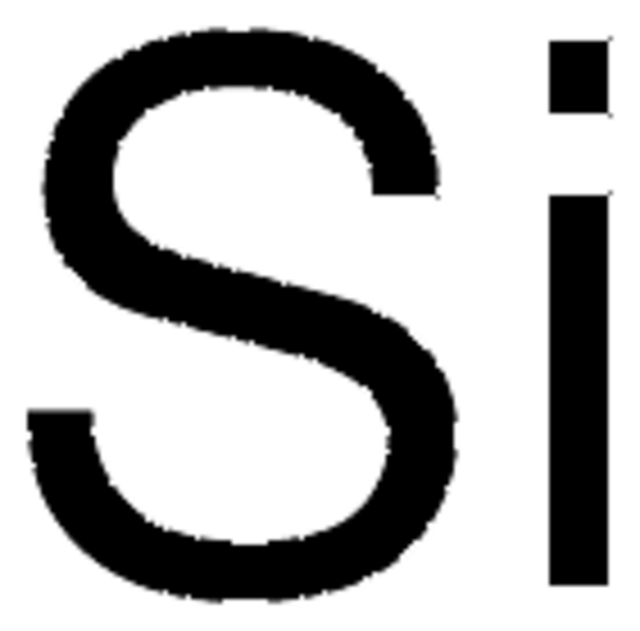262951
Silicon monoxide
powder, −325 mesh
Synonym(s):
Silicon monooxide
Sign Into View Organizational & Contract Pricing
All Photos(3)
About This Item
Linear Formula:
SiO
CAS Number:
Molecular Weight:
44.08
EC Number:
MDL number:
UNSPSC Code:
12352303
PubChem Substance ID:
NACRES:
NA.23
Recommended Products
form
powder
Quality Level
particle size
−325 mesh
density
2.13 g/mL at 25 °C (lit.)
application(s)
battery manufacturing
SMILES string
[O+]#[Si-]
InChI
1S/OSi/c1-2
InChI key
LIVNPJMFVYWSIS-UHFFFAOYSA-N
Looking for similar products? Visit Product Comparison Guide
Related Categories
General description
Silicon monoxide (SiO) is a unique compound with high optical transparency and electrical conductivity. Its ability to form thin films allows for effective use in optoelectronic devices, such as solar cells and photodetectors, where it enhances light absorption and charge transport. Additionally, SiO exhibits promising characteristics for use in battery technologies, particularly in lithium-ion batteries, where it can improve energy density and cycle stability.
Application
- Unraveling the Fundamental Mechanism of Interface Conductive Network Influence on the Fast-Charging Performance of SiO-Based Anode for Lithium-Ion Batteries.: This paper explores the role of interface conductive networks in enhancing the fast-charging capabilities of SiO-based anodes. The research highlights the critical mechanisms influencing the performance, offering pathways to develop high-efficiency lithium-ion batteries (Zhang et al., 2023).
- Distinctive Electric Properties of Group 14 Oxides: SiO2, SiO, and SnO2.: The study compares the electrical properties of various group 14 oxides, including silicon monoxide, to understand their potential applications in energy storage and other technologies. The findings provide a detailed analysis of SiO′s unique properties (Guerreiro et al., 2023).
signalword
Warning
hcodes
Hazard Classifications
Eye Irrit. 2 - Skin Irrit. 2 - STOT SE 3
target_organs
Respiratory system
Storage Class
13 - Non Combustible Solids
wgk_germany
WGK 3
flash_point_f
Not applicable
flash_point_c
Not applicable
ppe
dust mask type N95 (US), Eyeshields, Gloves
Choose from one of the most recent versions:
Already Own This Product?
Find documentation for the products that you have recently purchased in the Document Library.
Customers Also Viewed
Hongwei Ma et al.
Langmuir : the ACS journal of surfaces and colloids, 22(8), 3751-3756 (2006-04-06)
The modification of silicon oxide with poly(ethylene glycol) to effectively eliminate protein adsorption has proven to be technically challenging. In this paper, we demonstrate that surface-initiated atom transfer radical polymerization (SI-ATRP) of oligo(ethylene glycol) methyl methacrylate (OEGMA) successfully produces polymer
Chih-Wei Hsu et al.
Journal of colloid and interface science, 324(1-2), 236-239 (2008-06-03)
A simple, fast, and low-compound-consuming procedure based on the air-liquid interface-assisted method for preparing self-assembled monolayers (SAMs) of organic molecules with phosphonic acid head groups on the native oxide surface of silicon was demonstrated. The SAMs thus prepared were characterized
Jana Lokajová et al.
Electrophoresis, 31(9), 1540-1549 (2010-04-02)
Bupivacaine is a lipophilic, long-acting, amide class local anesthetic commonly used in clinical practice to provide local anesthesia during surgical procedures. Several cases of accidental overdose with cardiac arrest and death have been reported since bupivacaine was introduced to human
Taizo Kobayashi et al.
Lab on a chip, 11(4), 639-644 (2010-12-04)
This paper reports a novel combination of hydrophilic/hydrophobic materials for the evolution of liquid manipulation. Droplet generation based on a hydrophilic/hydrophobic mechanism is a promising method for highly accurate liquid manipulations. Although several droplet manipulation devices utilizing hydrophilic/hydrophobic patterns have
Vishva Ray et al.
Nature nanotechnology, 3(10), 603-608 (2008-10-08)
Devices in which the transport and storage of single electrons are systematically controlled could lead to a new generation of nanoscale devices and sensors. The attractive features of these devices include operation at extremely low power, scalability to the sub-nanometre
Articles
Advanced Inorganic Materials for Solid State Lighting
Our team of scientists has experience in all areas of research including Life Science, Material Science, Chemical Synthesis, Chromatography, Analytical and many others.
Contact Technical Service








